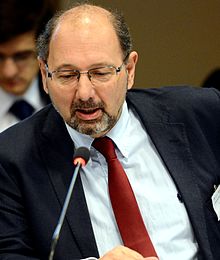Richard Sakwa

Richard Sakwa (born 1953) is Professor of Russian and European politics at the University of Kent. He has written books about Russian, Central and Eastern European communist and post-communist politics.
Career[]
Sakwa is Professor of Russian and European politics at the University of Kent. From 2001 to 2007 he was also the head of the University's Politics and International Relations department. He has published on Soviet, Russian and post-communist affairs, and has written and edited several books and articles on the subject.[1][2]
Sakwa was a participant of Valdai Discussion Club, an Associate Fellow of the Russia and Eurasia Programme at the Royal Institute of International Affairs, a member of the Advisory Boards of the Institute of Law and Public Policy in Moscow and a member of Academy of Learned Societies for the Social Sciences.[1]
Reception[]
Sakwa is renowned for his nuanced and incisive analysis of Russian politics and society.[3]
Michael Rochlitz, an associate fellow at the Higher School of Economics in Moscow, described his book Putin Redux as 'detailed, balanced and sober'.[4] His book Frontline Ukraine, interprets Russian military intervention in Ukraine as a reaction by Russia to eastwards expansion of NATO and a symptom of the breakdown of the post-Cold War European security order.[5][6] The book was well-received by the US dissident Noam Chomsky,[7] historian Paul Robinson[8] and political scientist Serhiy Kudelia.[9] The Ukrainian-British academic and former NATO employee Taras Kuzio criticised Sakwa for what he saw as pro-Russian bias and lack of expertise on Ukraine.[10]
Published works[]
Books[]
- The Putin Paradox, (I.B. Tauris, 2020) [ISBN 978-1-788-31830-3 paperback]
- Developments in Russian Politics, Ninth Edition, (Red Globe Press, 2018).
- Russia Against the Rest: The Post-Cold War Crisis of World Order (Cambridge University Press, 2017)
- Frontline Ukraine: Crisis in the Borderlands (I B Tauris, 2015) ISBN 978-1-78453-064-8
- The Crisis of Russian Democracy: The Dual State, Factionalism and the Medvedev Succession (Cambridge, Cambridge University Press, 2011). [ISBN 978-0-521-76842-9 (hbk); ISBN 978-0-521-14522-0 (pbk)]
- Communism in Russia: An Interpretative Essay (Basingstoke, Palgrave Macmillan, 2010), pp. vii + 167. [ISBN 978-0-333-60679-7 paperback]
- Russian edition: Коммунизм в России: интерпретирующее эссе. — М.: РОССПЭН, 2011. — 160 с. — (История сталинизма). — ISBN 978-5-8243-1596-7.
- The Quality of Freedom: Putin, Khodorkovsky and the Yukos Affair (Oxford, Oxford University Press, 2009), pp. 426. ISBN 978-0-19-921157-9
- Putin: Russia’s Choice, fully revised and updated 2nd edn (London and New York, Routledge, 2008), pp. 388. [ISBN 978-0-415-40765-6 (hbk); ISBN 978-0-415-40766-3 (pbk); ISBN 978-0-203-93193-6 (ebk)]
- Russian Politics and Society, Fourth Edition, completely rewritten and reorganised (London and New York, Routledge, 2008), pp. 585. [ISBN 0-415-41527-6 (hbk), ISBN 0-415-41528-4 (pbk), ISBN 0-203-93125-4 (ebk); ISBN 978-0-415-41527-9 (hbk), ISBN 978-0-415-41528-6 (pbk), ISBN 978-0-203-93125-7 (ebk)]
Fifth Edition (2021).
- Putin: El Elegido de Rusia (Madrid, Ediciones Folio, S.A., 2005). ISBN 84-413-2251-1
- The Rise and Fall of the Soviet Union, in the Routledge Sources in History series, General Editor: David Welch, Professor of Modern History, UKC (London, Routledge, 1999), pp.xxi + 521. [ISBN (hbk) 0-415-12289; (pbk) 0-415-12290-2] A book of annotated documents charting the political and moral trajectory of communism in the USSR.
- Postcommunism, in the series Concepts in the Social Sciences, General Editor Frank Parkin (Buckingham and Philadelphia, Open University Press, 1999), pp. 144. [ISBN 0-335-20058-3 (hbk); ISBN 0-335-20057-5 (pbk)] Translated into Portuguese as O Pós-comunismo (Lisbon, Instituto Piaget, 2001), pp. 203. ISBN 972-771-443-9. Spanish translation went to press in September 2004.
- Soviet Politics in Perspective, Second fully reworked edition of Soviet Politics: An Introduction (London, Routledge, October 1998), pp. xiii + 355. [ISBN 0-415-16992-5 (hbk); ISBN 0-415-07153-4 (pbk)]
- Gorbachev and His Reforms, 198590 (London, Philip Allan/Simon and Schuster, October 1990; Englewood Cliffs, NJ, Prentice Hall, February 1991), pp. xiv + 459. [0-86003-423-2 (hbk); 0-86003-723-1 (pbk)]
- Soviet Politics: An Introduction (London and New York, Routledge, June 1989), pp. xvi + 356. [ISBN 0-415-00505-1 (hbk); ISBN 0-415-00506-X (pbk)]
- Soviet Communists in Power: A Study of Moscow During the Civil War, 191821 (London, Macmillan, July 1988; New York, St Martins, 1988), pp. xxii + 342. [0-333-39847-5]
References[]
- ^ Jump up to: a b "Professor Richard Sakwa". University of Kent. 19 May 2016. Retrieved 25 June 2016.
- ^ Richard Sakwa, ed. (2005). Chechnya: From Past to Future. Anthem Press. ISBN 978-1-84331-164-5.
- ^ https://www.bloomsbury.com/us/the-putin-paradox-9781788318303/
- ^ Rochlitz, Michael (2016). "Book Review: Richard Sakwa, Putin Redux: Power and Contradiction in Contemporary Russia". Political Studies Review. 14 (2): 298. doi:10.1177/1478929916630921l. S2CID 148402701.
- ^ Whitmore, Brian (3 June 2016). "The Morning Vertical, June 3, 2016". RFE/RL. Retrieved 25 June 2016.
- ^ Sakwa, Richard (2016). "Letter to Editor". Europe-Asia Studies. 68:6 (6): 1102–1104. doi:10.1080/09668136.2016.1202590. S2CID 217505551.
- ^ "American Power Under Challenge". 8 May 2016. Retrieved 28 April 2018.
- ^ Robinson, Paul (20 May 2015). "Review - Frontline Ukraine: Crisis in the Borderlands". Retrieved 28 April 2018.
- ^ Kudelia, Serhiy (11 February 2015). "Book review: Richard Sakwa, 'Frontline Ukraine: Crisis in the Borderlands'". open Democracy. Retrieved 2 January 2020.
- ^ Kuzio, Taras (21 June 2016). "When an academic ignores inconvenient facts". New Eastern Europe. Retrieved 25 June 2016.
External links[]
![]() Media related to Richard Sakwa at Wikimedia Commons
Media related to Richard Sakwa at Wikimedia Commons
- Living people
- Academics of the University of Kent
- 1953 births
- Historians of Russia
- Alumni of the University of Birmingham
- British political scientists